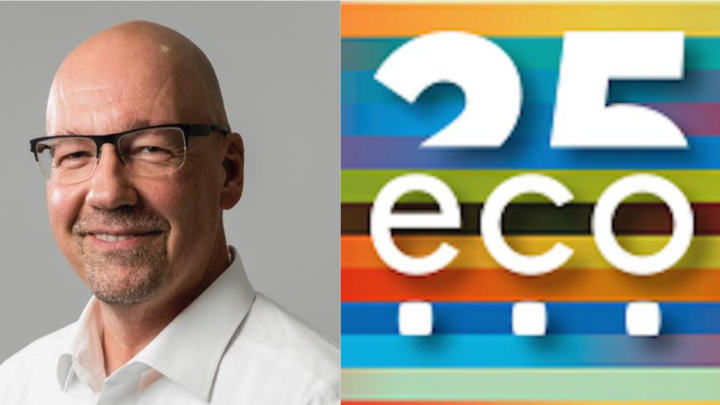“Education is a large part of our mission” – Interview with Axel Pawlik
Axel Pawlik, former MD of RIPE NCC, reminisces on the early days of RIPE & eco, and on how the tech community found its voice to start talking to governments.

dotmagazine: Axel, in eco’s anniversary year, we’re looking back at how things began in the nineties. Could you just give me a little bit of your history – 20 years at RIPE? What stands out in your memory from your early days?
Axel Pawlik: Well, I came to RIPE in October 1999. I had heard about RIPE, and I had an idea what I would be doing. What I found very attractive was that it would be a not-for-profit, bottom-up industry self-regulatory model that I could shepherd. Very much member based, and I liked the idea - and this turned out to be true.
RIPE NCC at the time was about 60 people. It was in some sense a typical geeky Internet start-up type of company, while being not-for-profit. We were having massive problems getting people in, to allocate address blocks. The Internet was really exploding at the time, and we just didn't have enough people – it was hard to attract people because we were not-for-profit. You couldn't give out Ferraris and huge bonuses like the dot coms would do. So that was our first challenge to get the people in, to get the waiting queue down for the address blocks.
Just before, we had been quite sidetracked by the appearance on the horizon of ICANN and the whole political rigmarole around that. So we were focusing a bit on the outside. And the previous CEO fell sick for quite a while. While the services were running, there hadn't been enough attention paid to expanding capacity to the skyrocketing demands at the time.
That was my first “aha” moment, when I saw our service really wasn’t great, but still the members and our community – the RIPE community and especially the RIPE NCC members – were understanding. And while they were justifiably upset, they were also very supportive. I was just amazed by the amount of goodwill and support that the organization had in hard times, where we were delivering a bad service, frankly. We turned that around and that worked increasingly well.
dot: What other “aha” moments did you have later?
Pawlik: Well, in the early 2000s, at one of the ICANN meetings, a former colleague of mine predicted that my job wouldn’t last for long, because the governments would want to take it on. And sure enough, a couple of years later, the governments became interested in the World Summit on Information Society, WSIS, which led them to set up the Internet Governance Forum.
It took a couple of years for me to start to understand how the UN system worked. At that time, we were outsiders – we were not even allowed into the room. Then at some point we were allowed into the room in a couple of meetings, but we couldn't speak. Then we were gradually allowed to speak by coming together as the wider community – the technical community, the business community – and finding a voice. Again, it was working together for a common cause, and that worked well.
So, the IGF was established, and I still like it for being a “talk shop”. We come together, we learn from each other. That was especially important in the early years, with some governments around the world increasingly getting nervous: “Oh, you’re running root name servers, but why are there only 13? And why are professors running them under the table? And we as the government of ..., we need to have a say in this.”
So we needed to explain: “It’s not quite like that. There are so many of them. There are twelve organizations who run them. But if you want some in your country that can be arranged.” And then we got a couple of root servers into that country and that worked so well. That was another light bulb moment: that we need to work with the governments.
dot: Why was this a new idea?
Pawlik: I started this in the second half of the 80s at university. First, this networking thing started, and then this Internet thing started in the US. We read all the cyberpunk novels, Gibson and the like. Barlow and the EFF had already come out with the Declaration of Independence of Cyberspace. You know, “Governments of the Industrial World, you weary giants of flesh and steel, I come from Cyberspace, the new home of Mind. On behalf of the future, I ask you of the past to leave us alone. You are not welcome among us. You have no sovereignty where we gather.” Very romantic, very appealing to us, of course.
But now things have changed. We have come to understand that governments have sovereign and legitimate rights and interests to have a say in all this, so we can’t keep them outside. So this goes into the challenges for the next years. With the IGF, we thought for a moment that this was settled. But then again, it’s not quite settled yet – we saw that in 2018 in France, with Macron saying there needs to be regulation here.
Maybe there does need to be regulation, if we can’t get it done ourselves properly. We need at least to talk together with the governments and law enforcement agencies and the like, to understand each other's needs and possibilities. How can we work together to come to a good outcome that is not top-down regulation that does bad things. I don’t mind regulation that makes sense and is implementable and is for the common good.
dot: So what was your work with governments like?
Pawlik: Well, on the internal side, on the techie side, we give out address blocks, and we do measurements around the globe. That’s all very cool, geeky stuff. But on the outside, we have to translate this and explain to governments what we are doing, how we are doing it, how the Internet looks in their countries. The RIPE NCC published a country report for Germany late last year, putting a spotlight on the Internet in Germany. That is helpful, the governments say.
I do also remember way back when, at an ARIN meeting in America, we were asked to go to a back room; there were three people around the table and ourselves, the CEOs of the RIRs. Turns out those guys were FBI agents. And they asked us to switch off IP addresses. We had to explain that we couldn’t. That’s not our role. We allocate them, but we don’t have any role in the operations of the Internet. This went back and forth, back and forth.
And it turns out then that a couple of those FBI agents turned up regularly at RIR meetings, at IGFs, at ICANN meetings. So they have, again, a legitimate interest, but we need to engage with them. Otherwise they can come from the side and disturb our operations.
At the RIPE NCC for the last five to seven years now, we have a great number of contacts with the law enforcement community. We do trainings for them – law enforcement agencies in the UK are especially interested. But it’s important to find a way to work together so that our members still support this, because we are totally membership based, and membership financed. Our members might raise an eyebrow if we go off on a tangent and train all the law enforcement people in our service suites.
And there I see an interesting development. In the beginning, we were the tech community, we were running the Internet, we were working towards helping people run their Internet parts. That was a common goal and a common objective. What I saw developing as IPv4 ran out over the last 10 years or so is that the community was diversifying. It’s not only people running the Internet. There’s also people who trade in IP addresses, to help other people run the Internet, but also to make a lot of money. So in the policy development process, I've seen a development that is not characterized by us all understanding the same common good.
We always said we’re an open community – you can come to any RIPE meeting off the street if you have any interest in IP address allocation or anything else in the operation of the Internet. And that includes your grandmother and that includes the local police officer or the German government. And then all the governments do turn up. First was the German government coming with a policy proposal for IPv6 allocation. With a bit of grumbling, the policy was worked on, discussed, debated, accepted and implemented. And that was proof that governments had an interest, could come to the community, could be part of the community and work within it, with an excellent result.
And then Europol turns up and says, basically, there are bad things happening on the Internet and we – the police forces around the world, but in this case, Europe – need to have direct access to much more data than you currently have in the public database. They had the problem that first, they find out that an address was used by a company in, let’s say Bulgaria, and then after many, many months of MLAT processing they go to Bulgaria, and then they find out that the address was self-allocated, and now it's somewhere in the Seychelles. Certainly, it really hinders their work as police, so they wanted us to make much more information available in the RIPE database.
The community response within RIPE was not so welcoming of the idea, to put it mildly. But it really was necessary to recognize that they are also a member of the community. It's understandable that there are conflicting needs and objectives, but it is important to have a civil discourse instead of simply accusing each other of insanity. So that is the challenge that I see now: We need to make sure that, as a community, we are indeed welcoming and have a civil debate.
By now, governments and regulators tend to understand better what we do, but there’s always a need to understand more and better, and for outreach and education capacity building. We see quite a churn in government employees, so we need to re-educate all the time. Education is a large part of our mission.
dot: Going back in time again, tell me about your experiences of the early stages of peering in Europe, and the beginnings of eco.
Pawlik: I must say I’m not peering expert, but of course I looked at it a bit from the office next door, in a way. We were running EUnet at the time, one of the two first commercial Internet service providers in Germany or maybe in Europe. We were sharing our line to the US from Amsterdam among all the national European EUnet networks. So in a way, it’s a bit like peering – we all connected to Amsterdam and we exchanged our traffic locally within Europe instead of always going to the US.
Then at the same time, while we were doing this in one office at the University of Dortmund, down the hallway was Rüdiger Volk – who is currently still working at the Deutsche Telekom, but at the time he was at the University of Dortmund – and there were the first ideas of the Interessengemeinschaft DENIC that he was involved in, together with a couple of other people: getting the emerging German Internet service providers to connect together into one point. At the same time, also in the same office, we saw the first instance of DENIC, the ccTLD operator.
So it was an interesting time. So many things happening on the same corridor or between a handful of people. It’s amazing to see that those people are still around. You know, Arnold Nipper is still there. He was our friendly competition in Karlsruhe at the time.
I met Harald Summa around that time, in the early 90s, when we were trying to find offices outside of the university, and Harald was doing his software industry support center in a sort of incubator set-up. And he had a couple of free offices which he sublet to us. And he then looked at what we were doing, and was interested in this Internet thing.
So Harald was awake to the idea that there really was something happening. And with his mindset, he then came up with the idea of eco. And I always laugh when I see him these days – you're still here, and I'm still here! – or I at least was still there till I retired. And it’s interesting to see how prominent eco has become since the early days, and DE-CIX as well.
Of course, our challenge is to keep these organizations working in a way that is sustainable. Speaking for the RIPE NCC – which is supported by our members – while not necessarily growing our mandate, we still need to be developing our mission and being clear that what we are doing is beneficial for the Internet at large. That’s the case for RIPE NCC members, but also for people working together within eco. You see a similar thing with the ccTLDs. It’s a big, bumbling, colorful eco-sphere of organizations for the betterment of humanity.
You know, I am an old ham radio operator – we always wanted to talk to each other for the betterment of humanity!
From October 1999 to November 2019, Axel Pawlik served as the Managing Director of the RIPE Network Co-ordination Centre (RIPE NCC). The RIPE NCC is a membership association under Dutch law, which serves as Regional
Internet Registry (RIR) providing Internet number registration and other services in Europe, The Middle East, and parts of Central Asia. During this time, he served in various positions on the Executive Council of the Number
Resource Organisation (NRO), which facilitates coordination between the five RIRs globally. Mr. Pawlik founded EUnet Deutschland GmbH in 1992 and under his leadership it became the market leader in Germany and one of the strongest EUnet networks in Europe. Mr. Pawlik graduated from the University of Dortmund with a Masters Degree in Computer Science.
Please note: The opinions expressed in Industry Insights published by dotmagazine are the author’s own and do not reflect the view of the publisher, eco – Association of the Internet Industry.




